
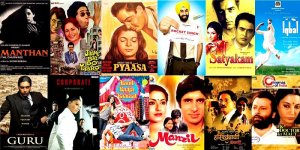 Films are often a reflection of our society but they also hold a mirror to us. It is no wonder then that the good ones go on to show the tragedy and triumph of the human life, thereby influencing all of us in some way. We’ve handpicked these 20 movies that show the tenacity, passion and undying spirit of its characters which all entrepreneurs can relate to.
Films are often a reflection of our society but they also hold a mirror to us. It is no wonder then that the good ones go on to show the tragedy and triumph of the human life, thereby influencing all of us in some way. We’ve handpicked these 20 movies that show the tenacity, passion and undying spirit of its characters which all entrepreneurs can relate to.
Pyaasa (Guru Dutt, 1957)
The film follows the story of a young protagonist who has an undying passion for poetry. He is frowned upon by his brothers, who sell away his poems as waste paper. His poems are quite radical in which he laments about the poor, the destitute, and the arrogance of the rich after the departure of the British from India. It is only after he grows sick of the hypocrisy around him and declares that he is dead, that publishers embrace him and his work becomes famous.
The film’s message lies in the protagonist’s character and undying passion. His concern for the downtrodden is admirable, especially his love and friendship with a prostitute, who is sympathetic towards him, and assists him in finding a publisher. As the film ends with the protagonist getting all the recognition and publicity he deserved, but him growing disillusioned by the ways of the world, one cannot help but admire how passion and integrity triumphs over success and richness.
Satyakam (Hrishikesh Mukherjee, 1969)
The film is set in the final days of the British Raj in India, as a cohort of engineering students graduate a few months before Independence. The film’s protagonist is stubborn and principled. He refuses to compromise when it comes to doing the right thing, and as a result he struggles to cope with the changing times. The film is considered to be Dharmendra’s finest acting performance of his career. Director Hrishikesh Mukherjee called ‘Satyakam’ his favourite film. Considering that he has made masterpieces like ‘Anand’, ‘Bawarchi’, ‘Abhimaan’, ‘Chupke Chupke’ and ‘Khoobsurat’, this is a rare feat.
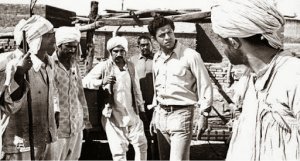 As the film’s protagonist moves from one job to another, he rejects all dishonest compromises. He is constantly reminded of his failure, and makes up for it by increasing rigidity about applying his principles in real life. While this leads to the huge number of struggles he faces, we soon associate with the protagonist’s flare for rationality and integrity. For an entrepreneur who often faces the same challenges of treading the road less travelled, ‘Satyakam’ is a must watch.
As the film’s protagonist moves from one job to another, he rejects all dishonest compromises. He is constantly reminded of his failure, and makes up for it by increasing rigidity about applying his principles in real life. While this leads to the huge number of struggles he faces, we soon associate with the protagonist’s flare for rationality and integrity. For an entrepreneur who often faces the same challenges of treading the road less travelled, ‘Satyakam’ is a must watch.
Manthan (Shyam Benegal, 1976)
The film revolves around the story of a vet doctor, who comes to a village with the aim of starting a milk cooperative society for the welfare of the villagers. He receives resistance from a wealthy businessman and the sarpanch of the village. The caste and communal dynamics of the village are also shown. Based on the real life story of Dr Verghese Kurien, the father of the White Revolution in India, the film goes on to show how Amul cooperative was founded.
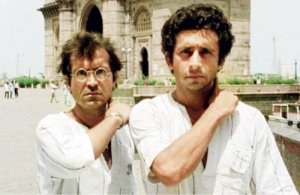 An obvious entry to the list, there is probably no film that explains rural entrepreneurship in a better way. The struggles involved in establishing a rural cooperative, in the backdrop of caste, gender and economic inequality is subtly shown. The helplessness of the film’s protagonist is very real, and we rejoice as he goes beyond the accepted norms of business, and works for a setup that benefits the deserving many.
An obvious entry to the list, there is probably no film that explains rural entrepreneurship in a better way. The struggles involved in establishing a rural cooperative, in the backdrop of caste, gender and economic inequality is subtly shown. The helplessness of the film’s protagonist is very real, and we rejoice as he goes beyond the accepted norms of business, and works for a setup that benefits the deserving many.
Manzil (Basu Chatterjee, 1979)
The film follows the ambition of an unemployed young man who has dreams of starting his own company. He starts a galvanometer business but the company fails due to competition in the market, eventually burdening him with huge debts. He had proposed marriage to his girlfriend by lying to her, whose father, a lawyer, now sues him for business fraud. The protagonist mends his ways and eventually emerges a winner.
The film teaches us to be ambitious, and follow our dreams, no matter what our economic background and circumstances are. More importantly it teaches us to accept mistakes and failure and learn to move on.
Related read: 11 Indian startups backed by Bollywood celebrities
Jaane Bhi Do Yaaro (Kundan Shah, 1983)
A dark satire on the rampant corruption in Indian politics, bureaucracy, news media and business, the film revolves around two friends, who are attempting to start their own photo studio. In their first assignment, they are suddenly exposed to shady activists, the corrupt world of Bombay real-estate, political hypocrisy and bureaucratic inaction. They soon get a whiff of a murder, and fight to bring the guilty to light, well, in a humorous way.
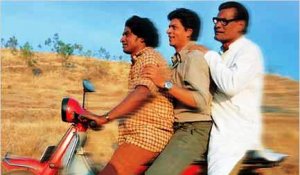 The film shows everything that can go wrong when one tries to be an entrepreneur, and things don’t work in his favour. Through humour, the film brings out the dark side of India’s democratic mercenary. By the end of the film, everyone except the two entrepreneur protagonists is found corrupt. Perhaps the best comedy of errors centred on the idea of starting a business, the film is a must watch for those who haven’t. And for those who have, well, weekend is around.
The film shows everything that can go wrong when one tries to be an entrepreneur, and things don’t work in his favour. Through humour, the film brings out the dark side of India’s democratic mercenary. By the end of the film, everyone except the two entrepreneur protagonists is found corrupt. Perhaps the best comedy of errors centred on the idea of starting a business, the film is a must watch for those who haven’t. And for those who have, well, weekend is around.
Ek Ruka Hua Faisla (Basu Chatterjee, 1986)
The Hindi remake of Sidney Lumet’s ‘12 Angry Men’, the film follows 12 members of a jury who gather in an enclosed room to deliberate their decision on a charge of murder against a young man who has been accused of killing his father. Except the film’s protagonist, everyone is convinced of the young man’s guilt. The protagonist goes on to convince everyone of the possible innocence of the young man.
The film’s greatest triumph is to depict how personal prejudices and biases often affect our decision making. The protagonist’s stand against all odds is inspiring and reminds us of the great heroic stories we have always heard – only this time, he seems to be on the wrong side. As the film progresses, we understand subjectivity and learn the importance of conversation and debate in the astonishing human ability of factual decision making.
Ek Doctor Ki Maut (Tapan Sinha, 1990)
The film follows the tragic story of a junior doctor, who discovers a vaccine for leprosy, and the war for recognition that follows. Eventually, two American doctors receive credit for discovering the vaccine. As a final ray of hope, our shattered protagonist receives an invitation from a foreign foundation inviting him to be a part of an eminent group of scientists working on other diseases. He realizes that his research was fruitful, and decides to accept the invitation as he continues to work for the betterment of mankind, and not immediate success or recognition.
The film’s primary message is to work for the larger goal and not for immediate perks. The film goes on to make us realize that the world is not always a fair playing ground but it is these few good men, on whose shoulders it stands. Belonging to this small group is greater glory than any recognition can ever bring us.
Lagaan (Ashutosh Gowariker, 2001)
Set in the Victorian era, the film is about the people of a small village who stake their future on a game of cricket against their ruthless British rulers. On one side we see veteran British cricket players, and on the other side are villagers, including the protagonist himself, who have never played the game before.
Cricket takes a back seat in the film, as the plot progresses to teach us to challenge injustice through collective struggle, even in our smallest capacity. The film shows how even the inexperienced, when working for a cause larger than themselves, have the capacity to work in synergy and turn things over.

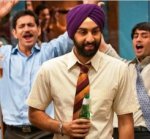
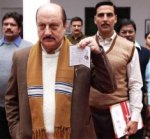
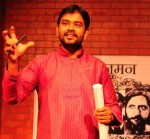
INTERESTING VIDEO












